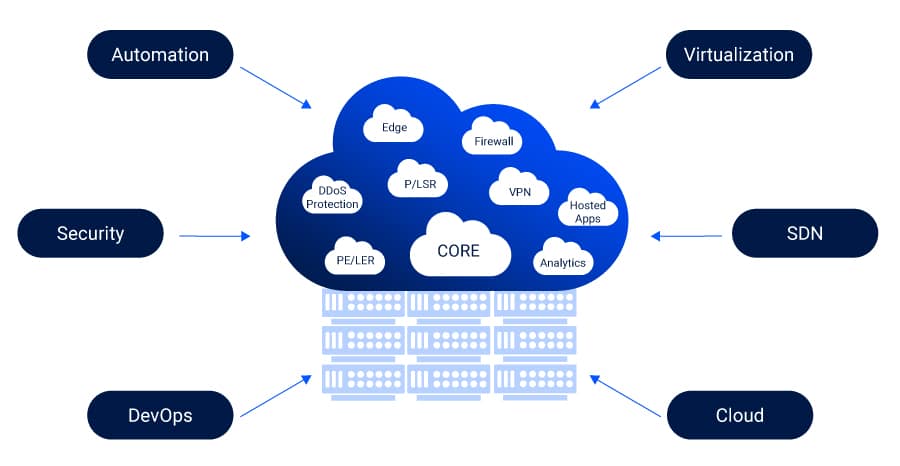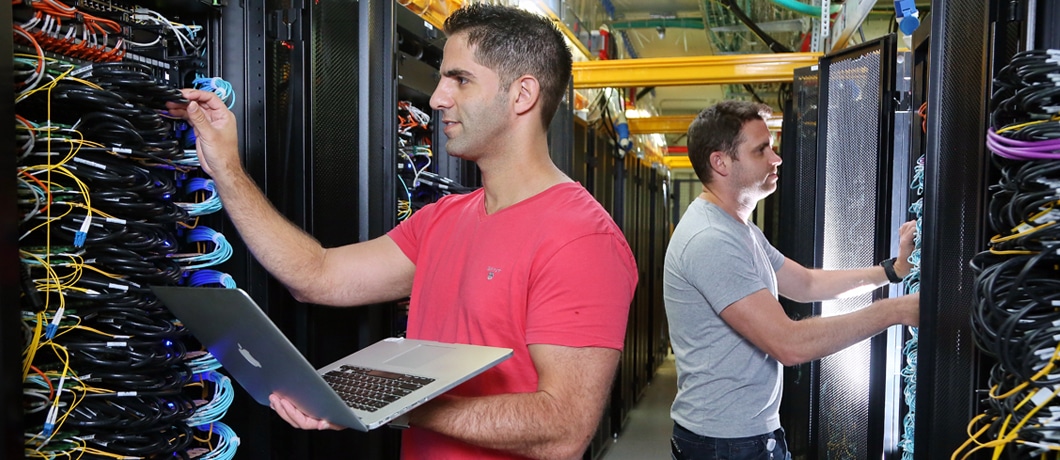“What happened to networking in the last seven to ten years? Nothing!”, said Ivan Pepelnjak, the well-known networking expert, when asked about the current impact of SDN, which started 10 years ago, on today’s networking. It’s actually even worse than that. Network architectures have not changed for the past 25 years, leading to network inefficiencies and greater complexity, and consequently increasing lower margin per bit for service providers.
What’s the next BIG THING in networking? What can we expect going forward? And where should network professionals focus on today to advance their careers and increase their responsibilities and positioning in the industry?
Let’s start with motivations and interests.
Some may look for more responsibility on their existing job. Some may be interested in learning a different technology and move to another domain. Different objectives lead to different tactics.
Getting More Responsibility
Becoming a director or team manager is a natural objective, but it’s not straightforward or suitable to everyone. Such positions do not come up too often, as service providers tend to limit their workforce growth while facing budget constraints. In addition, it forces network engineers to abandon the hands-on tech field that many love to do on a daily basis.
Becoming increasingly difficult to decide where to take my career. On the one hand I still love tech and want to learn new things. On the other hand it would be interesting to transition into a director/CTO ish role at some point in time.
Have you tried and did you regret it?
— Daniel Dib (@danieldibswe) June 30, 2021
Deepening Networking Skillsets with A Recognized Vendor Certification
Looking to complement your existing skillset to be better at your job? The royal path remains vendor certification like CCNP/CCIE, JNCIP/JNCIE. It covers not only the basics of networking but also vendor-specific implementations and hands-on practice. It requires time, commitment, and sometimes personal financial investment. Today, earning a certification can still create lucrative career opportunities and lead to a raise of $12,000 a year on average when having multiple certifications (source: Global Knowledge’s 2020 IT Skills and Salary Report).
Quitting a dead-end career & diving into Networking at 28 was both easier than I expected & scary as hell bc I didn’t have much in savings, but I had family kind enough to support me during transition. It was an enormous privilege I enjoyed that most people don’t have/receive.
— Tracket Pacer (@TracketPacer) July 5, 2021
Trying to study for a CCNA cert on my own while have a fulltime job as a social worker and also raising two kids. I felt good today, been doing som OSPF labs. Then I opened twitter up and read ”never get into tech if you can’t code”.
Making me doubt myself all over again.— Emirage (@Emirage6) June 30, 2021
There are endless discussions on what courses and certifications to take, vendor-specific or neutral, or whether taking a certification is still useful at all… (you can – see some recent references at the end of this blog). These are definitely important questions, but many ask themselves: What skills are or will be in high demand, particularly networking skills? What’s next for the CCIE/JNCIE engineers?
The Best Things to Learn Beyond Service Provider Networking
Let’s start with the obvious ones:
- Cloud. Google, Amazon, Microsoft are the escape route for ambitious telco network engineers. And it’s more than networking. It’s about IT with virtualization, automation and security. It’s about building new data centers or solutions-as-a-service at a very high pace. A lot of interesting technical things are relevant in this field, such as server virtualization and network disaggregation, advanced automation, security and even custom hardware development. The hyperscalers are paying well. A Google Cloud or Amazon AWS solutions certified architect can earn more than $ 150,000 a year on average (source: Global Knowledge’s 2020 IT Skills and Salary Report).
- Security/cybersecurity is another top-notch domain that can offer many opportunities, but it’s significantly different from other network domains, like switching and routing. Network engineers need to decide where their soul is.
- Automation with Ansible, DevOps, scripting (python) and even coding also offers new opportunities outside pure networking.
Yet, there are those who want to move from pure technology to functional roles. They can benefit from programs such as PMP (Project Management Professionals) or ITIL (Information Technology Infrastructure Library) that offer a wide range of career growth opportunities.
The Next Big Thing in SP Networking? Network Cloud
The true disruption and opportunity in networking is coming. After NFV (Network Function Virtualization) failed, the second attempt is on the way. It’s all about applying hyperscalers’ success in compute infrastructure to networks. A simplified, scalable, software-based architecture, networking white boxes, cloud-native technologies, Linux, hardware/software disaggregation, and automation are the main ingredients.
Service providers like telcos, cable or mobile operators are not only looking at the menu but have started to eat the first meal. All are considering disaggregated solutions for different use cases like core, aggregation, peering or 5G. For example, AT&T, KDDI, Telefonica,, Vodafone and many other tier-1 service providers have started PoCs, field trials and even large-scale productions (AT&T core routing and edge routing, KDDI/Vodafone/MTN and Telefonica DCSG).
What’s missing in this menu are the ‘cooks’, the professionals who are experts on cloud, virtualization, automation, and security. The goal is to transform the network architecture to reduce costs, scale up gradually and cost effectively, and deploy new services quickly. In other words, building networks like the cloud.

Multiple Options to Learn
How to achieve these new skillsets and obtain the maximum employer value? There are more options now than ever. For starters, general online education platforms, such as Udemy or Coursera, and Youtube videos, which enable you to learn the basic concepts. For advanced professionals, there is a lot of knowledge and insight to grab from networking podcasts, blogs or reddit groups. To go even deeper, IT and networking training platforms, such as IPSpace and PluralSight, offer advanced theorical classes, usually associated with blogs, podcasts and hands-on labs for practical learning. Last, cloud, security and virtualization solution vendors, like AWS, Google, Microsoft, and VMware, offer a large set of online training that can be completed by certification preparation courses from third parties.
Before Going Back to Your Network…
Today’s networks are nothing without the network professionals behind them, and their topnotch skillsets. Deepening networking skills, expanding towards new domains, and obtaining certifications bring increased benefits. We see improved work performance and engagement, and new opportunities for those who are interested in new technologies or functional expertise. The network cloud model is a serious option to consider for any network professional looking at investing in their careers. Better not to miss the wagon…(stay tuned for the upcoming available learning options!)
Some Resources:
Discussions about certifications:
Network Collective Podcast: High Value Certification for 2021 and Beyond (podcast)
CBT Nuggets: Life after the CCIE: What’s Next? (blog)
Hot network certifications: Multi-skill certs to dominate 2021(blog)
CCIE by 30 (blog and twitter)
Online training resources:
-
- Udemy
- Coursera
- Youtube channel:David Bombal
Specialized IT and networking training platforms:
Vendor-neutral training platform
Download White Paper
Introducing DriveNets Network Cloud




